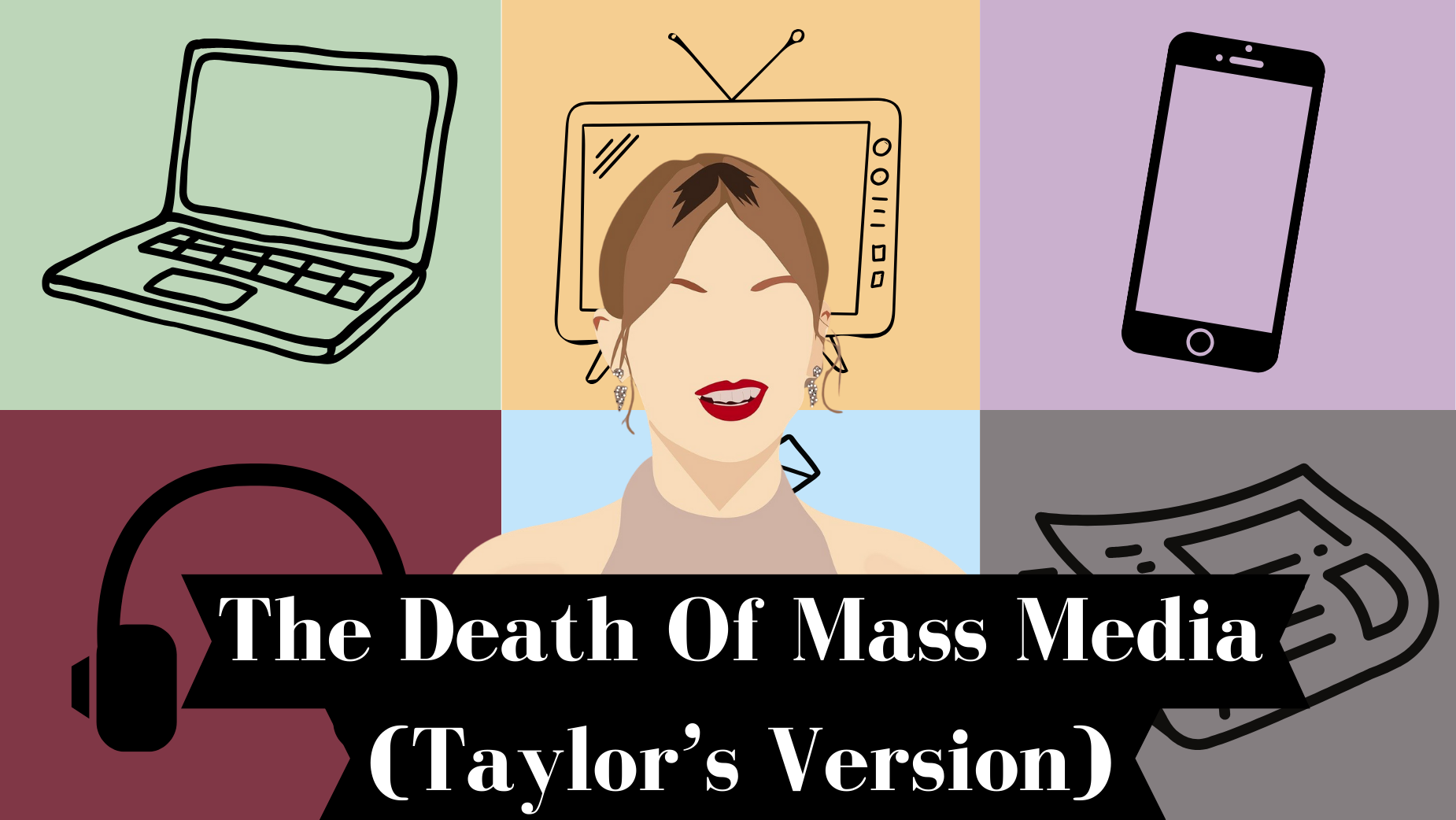
The Death of Mass Media (Taylor’s Version)

Australian stores are sold out of sequins, beads, and cowboy boots this week. Clothing is brighter, sunglasses are in the shapes of stars and makeup is being swapped for pounds of glitter glued onto cheeks. We are seeing the emergence of pure, unadulterated joy as hundreds of thousands of people flock to stadiums to witness not a sporting event, but a concert.
Amidst the clamour and hype, there's something almost comfortingly nostalgic about this Swift success story. In an era where we seem glued to our own devices, doomed to see the world through a unique window personalised to us, here is a rediscovery and celebration of shared experiences. Whether you're donning glitter or simply watching the news, the whole world knows about Taylor Swift. For brands and marketers, this poses a question:
Is mass media REALLY dead?
With the always learning, always developing algorithm providing users with content so incredibly tailored to them and their niche interests, are we entering a world where it will be harder for brands to target new audiences?
Are the days of going to work and knowing everyone will be talking about the same cultural moment around the watercooler over?
If they are, how does it affect brands? How does it affect creativity?
LBB’s Casey Martin posed this question to a few creatives within the industry in order to understand whether mass media is currently in its lover era, or if it’s all becoming folklore.

Olly Taylor - chief strategy officer, Havas Creative Group Australia
No doubt, all the data points to one thing: mass media is dying. Why? Because we're too focused on measuring its impact through a narrow media buying lens, ignoring its real influence on life and culture. Sure, brands can no longer buy large swathes of audiences, message them simultaneously and reap the reward, that ship sailed long ago.
But that doesn't mean mass media is dead and gone for brands. It just means the game has changed. In the past brands could shape culture with campaigns that created talkability with shared communal moments (think Nike in its prime). Now, it's all about hitching a ride on the big cultural moments that mass media is reporting on.
Take Taylor Swift rocking Dion Lee's crochet Suspend corset—instant mass media frenzy. It shows that blending into culture is way trickier than just buying airtime. It's about entertaining, not interrupting, and sometimes letting go of the reins on messaging.
So, is mass media done for? No. Is it harder for brands to figure out? You bet. But those who adapt and play by the new rules are the ones who'll come out on top.

Alex Houghton - strategy lead, 72andSunny
Is mass media dying? Absolutely not. Taylor Swift’s ability to bend the global media landscape around her every move shows that, now more than ever before, culturally relevant content has the ability to reach an enormous audience at lightning speed.
The media landscape has obviously fragmented. No single channel can still reach ‘the masses’. But digital media’s ubiquitous presence in our lives, via innumerable channels, apps and platforms, means the potential cumulative reach across all of these touchpoints is only increasing. This is the new mass media.
The challenge for brands is that they must look beyond the category they are nominally competing in, and start creating culturally relevant content that can compete in this landscape.
Nobody’s expecting every brand to consistently deliver Tay Tay-level engaging content. But the creative opportunities presented today - by YouTube, TikTok, sponsorships, partnerships, emerging technologies like AI, plus much more - to create and distribute culturally relevant content at scale, are amazing.
This is an exciting time to be using creativity to reach and engage a mass audience - and this is why 72andSunny is full of optimism about the future of marketing.

Nomfundo Msomi, executive strategy director, CHEP Network
Mass media isn’t dead. It’s our definition of it that needs reappraisal. We no longer live in a world of captive audiences! And even if there is a mass rallying around a moment in culture, the best brands create space for fans, they don’t try to drown them out. People opt into branded worlds now – and usually with deep intentionality and an expectation of reciprocity.
This is part of what makes Taylor Swift so unique. She only gets better and better at intimacy on a colossal scale, allowing her fans to make their own imprint on everything she puts out. Mass media isn’t a broadcast, but we still make the mistake of thinking of it that way and wondering why his work isn’t landing.

Johnny Green - partner and creative director, Heckler Sound
It’s certainly become more challenging to target new audiences however a willingness to not be afraid of change within the culture of a company might make it less so?
This can be very difficult. But the alternative may leave you dead in the water.
I think those days have been over for quite some time now with the exception of a major global event or major artist or brand release.
Consumers have been tailoring their spend and consumption for well over a decade towards platforms that are less susceptible to disruption.
I think it’s more challenging to impress someone these days but it is possible. There’s a lot of noise and you have to cut through more than ever.
I believe creative needs to be highly efficient and good. It’s not enough anymore to be moderately efficient and good.

Jacqui Capel - head of media, Today the Brave
Mass media isn't dying, it's just taking new shapes and entering new moments. Only around half of Australian households now watch linear TV daily, while 69% use at least one streaming service. TikTok is growing at lightning speed. We still love to gather around the water cooler to talk about the big cultural moments happening in broadcast, we are just also doing so online and in more interactive ways - and creating memes from funny moments in MAFS, analysing the Real Housewives body language in stitched videos, or choosing a side in the great #muggate influencer stoush. Essentially, what a cultural moment can be is now much broader, and led by consumer conversation and creativity, rather than just network output.
Georgia Pritchard - planning director, Howatson + Company
I think Taylor Swift proves that today, mass reach does not equate to mass appeal.
This week in Melbourne she played to the biggest audiences of her career (and probably many artist’s careers) totalling 288,000 screaming fans. That same week, a record-breaking number of Americans surveyed (nearly 1 in 5) said that she is part of a conspiracy to hack their democracy.
There’s no denying that she is a global heavyweight with an incredible fanbase. But just as she has galvanised fans, she has hardened haters.
For me, this polarisation of her brings to light the power (and threat) of self-learning social algorithms and echo chambers. As my TikTok feed serves every second video a shot of her Eras tour or ranking of her best bridges, I’m genuinely shocked when people nearest to me aren’t as equally obsessed with her - how can we be so similar, but not share this?
It highlights that loving Taylor Swift is by no means a universal experience. And as we scroll alone deep into our specific interests, we can lose sight of what we have in common.
That said, it doesn’t need to be a scary thing for brands. Again, she was Spotify’s top streaming artist last year, so it’s not all bad. Rather, she’s a reminder of letting go of trying to please everyone, because it can risk not connecting powerfully with anyone.
So, is mass media dying? I don’t think so. But, is mass consensus or mass appeal? Perhaps.

Simon Wassef - chief strategy and experience officer, Clemenger BBDO
Who said mass media was dying? Who are these people? Give me the names so I can shame them. We just love announcing the ‘death’ of something, don’t we? The ASMR of clicks, clicking on our clickbaity headlines as the coffin containing something (creativity, brand advertising, purpose, TV, whatever) is lowered into the ground.
But last time I checked, we just witnessed a mass media event called the Super Bowl. And we weren’t talking about the game. This thing was so mass that it became the media. And it became the algorithm. I’m not talking about the ads. That’s the easy bit. There were waaaay cleverer branded bits that were mass media gold AND made the algorithms go ape-shit.
And. We. Were. Loving. It.
In fact, it was such a masterclass of mass-media-gold-meets-algorithm-gold that I’m going to coin a new score for moments when brands achieved both: ‘Double Gold’.
Let’s recap:
Taylor Swift and Ice Spice partying with Blake Lively in the VVIP box was itself a culture-melting moment. Blake’s husband, Ryan Reynolds, took the chance to plug Deadpool 3 via Twitter (3 million likes, a bazillion impressions) without even being at the game. Double Gold certified. Usher rolled back the years to delight every millennial on the face of the earth, then brought out Ludacris and Lil Jon to send the algorithm into a nostalgia-fuelled flameball, all pimped by Apple Music and iPhone. Double Gold plated.
Side note: Spotify saw Usher streams increase by 550% after the half-time show. Single-gold only as, let’s face it, Spotify didn’t even have to get out of bed for that one. Amiri orchestrating algorithm carnage with a custom-designed suit for Travis Kelce’s pre-game fit. Double-gold sequined.
Beyoncé launching a new album via a Verizon spot? Double-gold. Dipped in more gold. So Triple-gold. Yes I broke my own system, that’s how good that was.
And let’s not forget to shout-out to the inaugural winner of the Double Gold, Rhianna, whose 2023 Half Time Show was so hot that the water inside water coolers around the world spontaneously began to boil, whilst Google searches of the lippy she put on mid-show increased by 3000%. The original Double Gold. This has always been the case. There have always been moments for sub-culture inside the mass media moments, and for niche trends to bubble up to the masses.
So, who are these people mourning the death of mass-media? Where are the people who don’t realise the algorithm works for exciting, mass ideas as much as it does for exciting niche ideas? They must’ve been tuned into the wrong channel while the rest of the world was immersing itself in the thing that makes everything tick: Taylor Beyoncé.






















